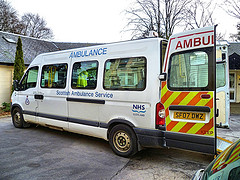 Many unexpected things can happen when a person is traveling. Other than accidents, a traveler may lose their possessions to theft. Being a victim of theft is something many travelers experience, especially if traveling to a foreign country. Locals in a foreign country have the perception that tourists bring a lot of cash and valuables along, and this makes travelers a common target for thieves.
Many unexpected things can happen when a person is traveling. Other than accidents, a traveler may lose their possessions to theft. Being a victim of theft is something many travelers experience, especially if traveling to a foreign country. Locals in a foreign country have the perception that tourists bring a lot of cash and valuables along, and this makes travelers a common target for thieves.
It is important for travelers to get a travel insurance policy that provides protection for cash and belongings before they travel. Although measures can be taken to prevent theft, sometimes, theft or loss of possessions can be quite inevitable. With a travel insurance policy that offers coverage for theft of personal effects, travelers can be sure they will get compensation for items stolen during their travel. The types of travel insurance coverage that provide protection against theft are baggage coverage, personal effects coverage, and cash coverage. These items are usually covered in a basic travel insurance policy, but some insurance providers may offer them as special coverage options. It is advisable that travelers get coverage for all their belongings, so they will get some compensation when theft occurs.
Most travel insurance policies only offer partial coverage for baggage or personal belongings, and it may come as compensation per item or set of items. Usually, there is a fixed rate of compensation regardless of the values of the items. Travelers should make a list of the things they are bringing with them including a record of the value of each item. Those who are bringing expensive items such as: jewelry, electronic gadgets, laptops, costly sports or activity equipment should get special coverage for these items, because ordinary travel insurance policies do not provide full coverage for them. There are certain types of policies that will compensate policy holders according to the current market value of each loss item.
Baggage coverage is most beneficial to travelers visiting a few different places when they travel. It provides protection for loss of baggage in the airport as well as other locations during travel, but some travel insurance policies only offer coverage for baggage within a certain city or region. Those who are traveling to many locations can pay extra cost to get unlimited area coverage.
Travelers need to report theft of their belongings to the police as soon as they can, so that they can get a police report to make claims for compensation. The best way travelers can protect themselves from theft is to keep a close watch on their belongings at all times when traveling.
Photo credit: https://www.flickr.com/photos/samiksha/

 Backpacking is becoming a more popular option among young travelers these days, because it enables them to discover many new places and cultures around the world. Backpackers travel on a budget, and they are exposed to higher risks of accidents, injuries, and illnesses: it is important for every backpacker to get a good backpacker travel insurance policy to provide sufficient compensation for expenses that may be incurred in the event of emergencies.
Backpacking is becoming a more popular option among young travelers these days, because it enables them to discover many new places and cultures around the world. Backpackers travel on a budget, and they are exposed to higher risks of accidents, injuries, and illnesses: it is important for every backpacker to get a good backpacker travel insurance policy to provide sufficient compensation for expenses that may be incurred in the event of emergencies.
 When people retire, they have more time to pursue their interests and dreams. They also have more time to travel. Blessed with higher spending power and other incentives, more and more senior citizens are traveling. Here are some useful travel tips for senior citizens, including the purchase of senior travel insurance:
When people retire, they have more time to pursue their interests and dreams. They also have more time to travel. Blessed with higher spending power and other incentives, more and more senior citizens are traveling. Here are some useful travel tips for senior citizens, including the purchase of senior travel insurance: Nowadays, the majority of airlines issue electronic airline tickets rather than traditional paper airline tickets. This has been the trend for quite some time and there are good reasons why more and more airlines are converting to e-tickets. Other than lower airfares, airlines and passengers will be delighted with electronic airline tickets because they can never be stolen or lost, unlike paper airline tickets.
Nowadays, the majority of airlines issue electronic airline tickets rather than traditional paper airline tickets. This has been the trend for quite some time and there are good reasons why more and more airlines are converting to e-tickets. Other than lower airfares, airlines and passengers will be delighted with electronic airline tickets because they can never be stolen or lost, unlike paper airline tickets. For students who are planning to travel abroad, the allure of going to a new country filled with the promise of exciting possibilities is certainly a dizzying idea. It can, however, all go wrong in a hurry if they don’t make the necessary preparations. Here are some useful tips (including getting student travel insurance):
For students who are planning to travel abroad, the allure of going to a new country filled with the promise of exciting possibilities is certainly a dizzying idea. It can, however, all go wrong in a hurry if they don’t make the necessary preparations. Here are some useful tips (including getting student travel insurance): As air travel becomes more affordable, more and more people are traveling all over the world. The idea of going to a faraway land is no longer far-fetched as there are many budget airlines to make it possible. No matter the carrier, there’s always a certain amount of risk associated with air travel. As such, it’s good to take a look at some of the benefits of flight accident insurance.
As air travel becomes more affordable, more and more people are traveling all over the world. The idea of going to a faraway land is no longer far-fetched as there are many budget airlines to make it possible. No matter the carrier, there’s always a certain amount of risk associated with air travel. As such, it’s good to take a look at some of the benefits of flight accident insurance. Nowadays, more and more single women are opting to travel alone. There’s something exotic and exciting about the endless possibilities which may come out of a trip to a foreign land. Other than the opportunity to “find yourself†as Joplin would remind, it’s also a fantastic chance to be totally free, and perhaps discover a side which you had never known existed. As much as there are fruitful experiences to be had, single women who travel alone are also exposed to some rather unique dangers. Here are some tips, in addition to travel insurance for single women, to help you along:
Nowadays, more and more single women are opting to travel alone. There’s something exotic and exciting about the endless possibilities which may come out of a trip to a foreign land. Other than the opportunity to “find yourself†as Joplin would remind, it’s also a fantastic chance to be totally free, and perhaps discover a side which you had never known existed. As much as there are fruitful experiences to be had, single women who travel alone are also exposed to some rather unique dangers. Here are some tips, in addition to travel insurance for single women, to help you along: